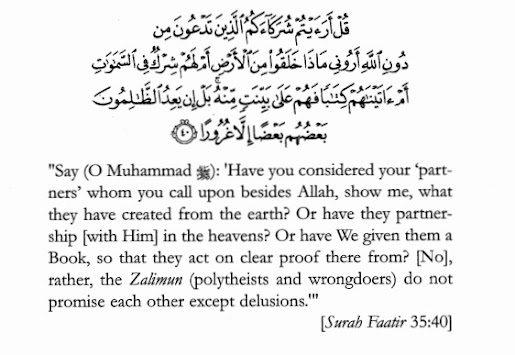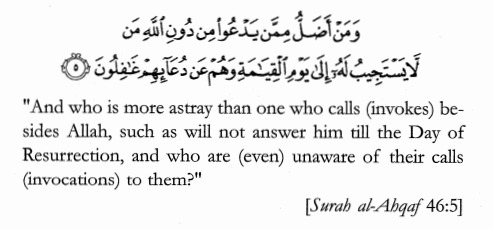لَا إِلَٰهَ إِلَّا ٱللَّٰهُ مُحَمَّدٌ رَسُولُ ٱللَّٰهِ
Starting with the name of Allah (Subhanahu wa ta'ala) The Most Merciful, the Entirely Merciful!
إِنَّ ٱللَّهَ لَا يَغْفِرُ أَن يُشْرَكَ بِهِۦ
Indeed Allah does not forgive association (shirk) with him
Surah Nisa Chapter 4 Verse 48
عَنِ ابْنِ عَبَّاسٍ عَنْ رَسُولِ اللَّهِ صَلَّى اللَّهُ عَلَيْهِ وَسَلَّمَ قَالَ قَالَ اللَّهُ عَزَّ وَجَلَّ مَنْ عَلِمَ أَنِّي ذُو قُدْرَةٍ عَلَى مَغْفِرَةِ الذُّنُوبِ غَفَرْتُ لَهُ وَلا أُبَالِي مَا لَمْ يُشْرِكْ بِي شَيْئًا
Ibn Abbas reported: The Messenger of Allah, peace and blessings be upon him, said, “Allah Almighty said: Whoever knows that I have power to forgive sins, I will forgive him and I will not mind, as long as he does not associate any partners with me.”
Al Mu'jam Al Kabir 11457 (Sahih according to Shaykh Al-Albani)

The Shirk Of Ahmed Raza Khan (Barelviyyah)
Ahmed Raza Khan Barelvi born 10 Shawwal 1272 AH (14th June 1865)
[Hayat 'Ala Hazrat Volume 1 Page 1]
Ahmed Raza Khan was and is still known for his poetic works in which his expression of shirk is radiant. Use of myths and legends, eradication of Sunnah of Prophet Muhammad PBUH and not even using the Qur'an shows how much of a deviant he was. In this article we will bring out evidences of his clear shirk in his own Books or Fatawas.
Lets take a look at the examples,
In one of his Fatwa where he was asked that if it is acceptable to say Ya-Rasool Allah or Ya-Wali-Allah in time of Calamity? And to ask help from Messengers, Wali-Allah and to say Ya-Mushkil Kusha Ali (O remover of Difficulties Ali) is acceptable or not? Please share Verses and Hadiths with Urdu Translation.
Ahmed Raza Khan replies, It is permissible when one considers them the servant of Allah, and a means in his court, and one considers to be with divine permission, and that they are from those who manage the affairs of the world by command of Allah........
He further continues, ...it was common amongst the Imams, the Scholars and the pious of every generation from the time of Prophet Muhammad PBUH, to calling upon the beloved of Allah in the time of calamities.
Ahkam-E-Shariat Page Number 12 Question Number 2
In the above mentioned reference he also quotes a Hadith from Tirmidhi which he fails to quote it fully with its context, the hadith is as follows,
Jami-At-Tirmidhi 3578 Book 46 Kitab-Ad-Da'wat
The Hadith clearly states that the man was supplicating with Prophet Muhammad PBUH and the words were [O Allah, I ask you and turn towards You by your Prophet Muhammad PBUH] but Ahmed Raza Khan tries to show to the world that saying Ya-Rasool Allah is permissible he changes the Hadith,
The words Allahumma Inni As'aluka turns to Ya-Muhammad Inni Tawajjahtu Bika making it look like the blind man is asking Prophet Muhammad PBUH not Allah SWT. (Nauzubillah)
That is clear forging of the Hadith of Prophet Muhammad PBUH.
The second Hadith mentioned in the Fatwa, really we do not got a clue from where he quoted that. And even if it is mentioned in the hadith it is missing context from it.
Ahmed Raza Khan says, Jibril (Alayhissalam) is the reliever of difficulties then who will hesitate to accept Huzoor-E-Aqdas (Prophet Muhammad PBUH) as the remover of ordeals and curer of afflictions? He (Prophet Muhammad PBUH) is also the reliever of Jibril's difficulties as well.
Malfuzat Page 99
Also calling towards the Hanbalite Shaykh Abdul-Qadir Al-Jeelani (Rahimahullah) and attributing falsely towards him as to be the reliever of difficulties and problems. They attribute the name Ghauth-E-A'zam meaning the greatest helper to
Abdul-Qadir Al-Jeelani. They also have a special prayer named as Salatul Ghathia for special desires, needs, helps, in which, One should recite Surah Ikhlas seven times in each Rak'ah, recite Salawat and Salam eleven times, and then take eleven steps in the direction of Baghdad (where Abdul-Qadir Al-Jeelani is buried) and at each step invoke the name of Abdul-Qadir Al-Jeelani, and say what one needs.
Risaalah Rizwiyyah Volume 1 Page 181
He also says, During my life I did not seek help from anyone and I do not ask anyone for aid except Shaykh Abdul-Qadir Al-Jeelani. Whenever I called from help,
Ya-Gauth is the only thing I said. Once I wished to call upon another Wali-Allah but my tongue cannot utter his name, but only Ya-Gauth would emnate from my tongue.
Mafuzat Page 307
He also mentions the following for Abdul-Qadir Al-Jeelani,
Hadaiq-E-Bakhshish Volume 1 Page 46 (English Version Translation by Aftab Qasim)
Also the Rafidhi Du'a Nad-E-Ali is also condoned by Ahmed Raza Khan,
The Du'a is falsely attributed towards Imam Jaffar As-Saadiq (Rahimahullah) without any proof or evidence, also for the clear view of the Du'a with English translation you can look at the picture below,

And along with the Du'a is the way of using it as mentioned in Sham'a Shabistan-E-Raza,
Shama Shabistan-E-Raza by Iqbal Ahmed Noori Page Number 49 (Urdu Version)
REFUTATION THROUGH THE QUR'AN
We went through the most clearest of Shirk in the name of Islam by Ahmed Raza Khan, we need to understand that this is nowhere to be found in the Qur'an and the Sunnah but we find the opposite to it. In Shaa Allah in the light of Qur'anic Verses, Sunnah of Prophet Muhammad PBUH and the Ijmah of the Ummah we will prove that this is not the way of Islam nor the way of Prophet Muhammad PBUH nor the way of Sahaaba.
The Following Qur'anic verses are clear and enough for the refutation of the claims of the mystics,
REFUTATION THROUGH THE SUNNAH
Prophet Muhammad PBUH said, Supplication is worship itself. Then he recited the following verse of the Qur'an, Your Lord said, Call upon Me and I will respond to you. Verily who disdain My worship will enter hellfire.
Jami-At-Tirmidhi 3247 (Sahih according to Shaykh Al-Albani)
Prophet Muhammad PBUH said, Allah Almighty said, Verily I am free of the idolatory of any partners. Whoever performs a deed in which he associates another with Me, I will abandon him to his partner.
Sahih Muslim 2985 (Sahih according to Shaykh Al-Albani)
REFUTATION THROUGH THE SCHOLARLY CONSENSUS
Imam Ibn-Al Qayyim said, The kinds of Shirk includes asking the dead for one's needs, or seeking their help or turning to them, This is the essence of shirk.
Fath-Al-Majeed Page 145
And Allah SWT knows the best.































Do comment here for the blog. In Shaa Allah!
ReplyDelete